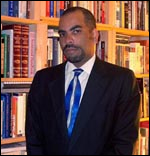
Hugh Page Jr. has been, and is, a man of many facets: blues harmonica player, translator of Hebrew texts, assistant mens tennis coach, newlywed, poet, Episcopal priest, theologian, black belt in karate.
And these days, as the new dean of Notre Dames First Year of Studies, Page is a bit of an explorer, sifting through his own student memories to craft the perfect message for incoming first-year students.
The First Year of Studies office front-loads the first-year experience beginning in summer, with a course selection process. Their work reaches a crescendo even before the academic year begins, with first-year orientation. New students and their parents will assemble Aug. 19 through 21 for a weekend immersion in the Notre Dame culture. While the Office of Student Affairs helps indoctrinate new students about life in the residence halls, Pages team must help these callow but gifted teenagersand their parentsstart grasping the nuances of the Notre Dame academic experience.
In the job for only a few weeks, Page had already reviewed memories of his own undergraduate experience and found them telling. In 1973 he arrived at the historically black liberal arts college Hampton Institute (nowHamptonUniversity) inVirginiawith every intention of becoming a lawyer. By graduation, he wanted to be a minister, and he attributes his change of heart to faculty and staff who helped guide him. After a few years of parish ministry, Page studied for masters and doctoral degrees in Near Eastern languages and civilizations.
I think the world is a much different place than when I began college in 1973,he says from a Coleman-Morse office that barely reflects its new occupant.There are the potential distractions that students face. The potential challenges that they face within the classroom and beyond are much greater and of a different intensity now. The anxiety about informed career choices and having to make them early in life is much more pronounced.
My hope is that they will see the first year as a time to make a safe transition from high school to college while, at the same time, becoming empowered to make their own unique educational and spiritual journey.
A minister still, spiritual by nature (even his blues band, the Oblates of Blues, is comprised primarily of theology colleagues), Pages contribution to orientation may be his fresh view of the college experiencethe academic challenge, the call to service and the search for a relationship with Godas a single, integrated experience.
And he makes it sound so joyful.
Technically, his staff has these students for a year. But Page, who worked with Arts and Letters undergraduates as associate dean in that college, sees the incoming class from a longer view as students who must findthe passion that fuels the intellectual enterprise over the course of a lifetime, that helps to make them not just solid citizens of the global community, but informed about the lifelong place that faith occupies in the shaping of a civil society.
We have to work with them to shape a learning plan thats highly individualized and also prepares them for those challenges beyond the campus boundaries,he says.
This involves molding what Page callsresponsible stewards of knowledge created and learned.Its a fresh and deeper interpretation of the purpose of education and community service.
Its one thing to learn,he explains,another thing to be a responsible steward of what youve been given. Responsible stewardship involves becoming a teacher by sharing what you have learned with those who have no access to the same resources. Education is a privilege, and responsible stewardship can only be exercised if we dont hoard what we know. With regard to knowledge, if were going to stand in solidarity with those who are not as fortunate, we will need to share it, as Christ did.
Although he hasnt done full-time parish ministry for some time, Page has a ministers view of the Christian community.
Somehow were all part of a single human family,he said.When we honor that reality and when we work to alleviate pain and suffering and employ all our intellectual gifts in making the world a more just, sustainable and loving place, we are living according to the highest ideals ever expressed within the human family.
While developing his message for orientation, Page also began to understand the logistics involved in shepherding students through the first year, the day-to-day work of his staff.
Its mind-boggling,he says. Fortunately, he added, so is his staff.Theyre a remarkable team of people fully committed to these values.
TopicID: 12762